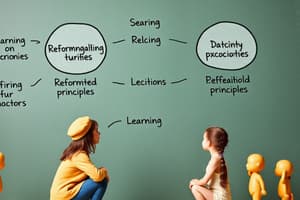Podcast
Questions and Answers
What does Learning Theory conceptualize?
What does Learning Theory conceptualize?
- Behavior can be observed.
- Behavior is determined by social environment. (correct)
- Consequences have no impact on behavior.
- All of the above.
What are B.F. Skinner's views on behavior?
What are B.F. Skinner's views on behavior?
The social and physical conditions of our environments are critically important in determining our behaviors.
What is Respondent Conditioning?
What is Respondent Conditioning?
It refers to the emission of behavior in response to a specific stimulus.
What type of learning does Operant Conditioning refer to?
What type of learning does Operant Conditioning refer to?
What do the ABC's of Behavior stand for?
What do the ABC's of Behavior stand for?
What is Reinforcement?
What is Reinforcement?
What is Positive Reinforcement?
What is Positive Reinforcement?
What are Material Reinforcers?
What are Material Reinforcers?
What are Social Reinforcers?
What are Social Reinforcers?
What are Tokens in behavior reinforcement?
What are Tokens in behavior reinforcement?
What does Modeling refer to in learning?
What does Modeling refer to in learning?
What is Negative Reinforcement?
What is Negative Reinforcement?
What is Punishment in behavioral terms?
What is Punishment in behavioral terms?
What is Extinction in behavioral learning?
What is Extinction in behavioral learning?
What does the Premack Principle state?
What does the Premack Principle state?
Flashcards
Learning Theory
Learning Theory
Behaviors are learned and maladaptive behaviors can be unlearned through interventions.
B.F. Skinner's Contribution
B.F. Skinner's Contribution
The setting (social & physical) influences behavior, thoughts, and feelings.
Respondent Conditioning
Respondent Conditioning
Behavior response to specific triggers (words, sights, sounds).
Operant Conditioning
Operant Conditioning
Signup and view all the flashcards
ABC's of Behavior
ABC's of Behavior
Signup and view all the flashcards
Reinforcement
Reinforcement
Signup and view all the flashcards
Positive Reinforcement
Positive Reinforcement
Signup and view all the flashcards
Material Reinforcers
Material Reinforcers
Signup and view all the flashcards
Social Reinforcers
Social Reinforcers
Signup and view all the flashcards
Tokens
Tokens
Signup and view all the flashcards
Modeling
Modeling
Signup and view all the flashcards
Negative Reinforcement
Negative Reinforcement
Signup and view all the flashcards
Punishment
Punishment
Signup and view all the flashcards
Extinction
Extinction
Signup and view all the flashcards
Premack Principle
Premack Principle
Signup and view all the flashcards
Study Notes
Learning Theories Overview
- Learning theory conceptualizes the social environment through behavior, its prior events, and subsequent consequences.
- Suggests that behaviors can be learned; maladaptive behaviors can be unlearned through targeted interventions.
B.F. Skinner's Contributions
- Emphasizes the significance of social and physical environments in shaping behaviors.
- Identifies that behavioral control is influenced by observable factors, impacting both thoughts and feelings.
Conditioning Types
- Respondent Conditioning: Behavior response to specific stimuli, such as words, sights, or sounds.
- Operant Conditioning: Learning influenced by the consequences that follow behaviors, shaping future actions based on rewards or punishments.
ABC's of Behavior
- The framework consists of Antecedents (events that trigger behavior), Behavior (the action itself), and Consequences (results that influence future behavior).
Reinforcement Mechanisms
- Reinforcement: Consequences that increase behavior frequency.
- Positive Reinforcement: Follows behaviors with positive outcomes, strengthening those behaviors (e.g., rewards).
- Material Reinforcers: Physical objects used as rewards to promote specific behaviors.
- Social Reinforcers: Verbal or non-verbal cues (e.g., smiles, praise) that display care and support.
- Tokens: Symbolic objects representing value, exchangeable for desired items or privileges.
Behavioral Learning Processes
- Modeling: Learning behaviors by observing others engage in those behaviors.
- Negative Reinforcement: Removal of a negative consequence, which strengthens a behavior by avoiding unpleasant conditions.
- Punishment: Introduction of aversive events or removal of positive reinforcers, leading to decreased frequency of behaviors.
- Extinction: The decrease or potential eradication of a behavior when reinforcement is withheld over time.
Premack Principle
- Engaging in a high-probability behavior as a reward for completing a low-probability behavior will increase the likelihood of the low-probability behavior occurring.
Studying That Suits You
Use AI to generate personalized quizzes and flashcards to suit your learning preferences.




